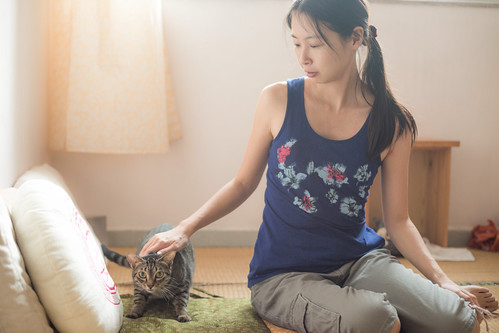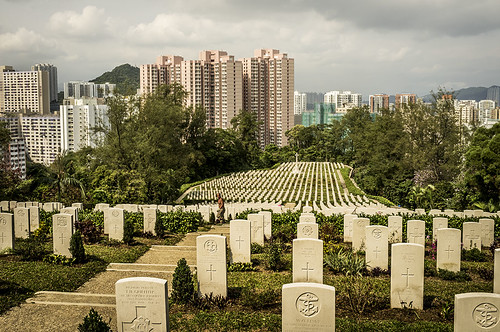中文版本
Photo by Tai Ngai-lung
What is your dream job? Do you like travel? How about being a travel writer? You explore the world, record your experiences, and earn your living out of it. Isn't that an enviable way to live?
I like to travel and I also write, but it is absolutely impossible for me to ever be a travel writer. If you know the pressure a travel writer endures, I believe you'll agree with me.
My friend and neighbour Chow Chung-wah is a travel writer for Lonely Planet. She's also written for in-flight magazines as well as a host of local and mainland publications. "Many think travel writing is an enviable job because you're paid to travel. But that's not the case. There's a timeframe, you must finish all tasks within a short period of time, and you have to go to places regular travellers don't go," Chung-wah said.
Chung-wah is frank about her dislike of transport interchanges in mainland China, but these are places where she spends an enormous amount of time collecting and verifying detailed transport information because reliable coach service timetables are essential to travelers, especially backpackers. "If I travel for leisure, there is no way I will spend more time than I need to at the interchanges," she said.

I told Chung-wah some time ago that I wanted to feature her in Urban Diary. It was her who introduced me to Flow, a second-hand bookstore on Hollywood Road that got me started reading books that people wanted to pass on. It was also thanks to her that I got to know about the story of Ah Wing the treasure keeper. I've since covered Flow and Ah Wing in this diary and finally I have an opportunity to introduce Chung-wah to you this time.
Both Chung-wah and I have been busy and we didn't get the chance to meet and go through the questions I've set her one-by-one until after she's finished the sections she's writing for a new Lonely Planet guide on Taiwan.
Chung-wah visited Taiwan three times in six months, and the time she spent in Taiwan during this period was only slightly shorter than the time she spent at home. Day-to-day life on the road for her consists of a great deal of background research prior to visiting the places she has to cover, note-taking during the actual visits, as well as writing of summaries every evening. Regular trips to the post office to send materials home are also part of her travel memories.
"It is not as romantic as many people think but I like my job," she said. The part she enjoys the most is having the opportunity to visit places even locals in a country haven't been to. For example, during her Taiwan trips she visited quite a number of mountainous areas where indigenous tribes live. These places are difficult to access and the natural landscapes are still primitive and stunningly beautiful.
Living with the eyes of a tourist is also her attitude when she is home. She finds multiculturalism in 'ordinary' corners of Hong Kong where most people don't pay any attention to. "The building where I live has quite a number of South Asians, but most Chinese residents in the block pretend that they don't see them or choose not to see them. When I look at Hong Kong as if I'm a tourist, I come across surprises all the time." So it's only fitting that during our interview, Chung-wah and I agreed to make a trip to Fanling to find the final resting place of Ip Man, the kungfu master who was Bruce Lee's mentor.
Chung-wah wasn't trained to be a writer. She was a law graduate and she was supposed to be a lawyer. But her only experience with the legal profession was the internship she's required to do as part of her degree.
"I don't like wearing a suit. I'm glad that I've never got to wear high heels for work. I like seeing and exploring the world. From very early on, I knew that sitting at the office from 9 to 5 wasn't for me. I could tell what my life would be if I became a lawyer: I would be either sitting at the office, or meeting clients. I wouldn't be able to see the world."
In 2002, after paying off her university loan, and with US$4,000 in her pockets, she started a 13-month journey that took her to the Middle East, the Caucasus and the Americas. This journey set the course of her travel writing career and her way of life. She started working freelance shortly after she returned to Hong Kong. Besides writing travel guides, she writes and translates for commercial companies.
"Most people want stability, but I'm not bothered by the uncertainty of freelancing. Freelancing gives me plenty of flexibility but it also requires tremendous discipline. Well, people usually don't respect freelancing as a career, but it's actually a career with a heavy workload. If you're freelancing, you're actually running a business – you're your own boss. You have no colleagues but you're always in contact with many people. They come from all walks of life and different countries. Nowadays, our world is no longer a place for 9 to 5 jobs. Who can get off at five? We should be embrace new possibilities. Not everyone should go to university, get cramped in MTR carriages every morning or get locked up in office politics."

Chung-wah said Hong Kong is a good place for freelancers. She attributes this to the city's smallness which makes it easy for people to mingle. Some of her foreigner friends initially only planned to spend a year in Hong Kong when they first arrived but they ended up freelancing and living here, and they are not planning to leave anytime soon. Hong Kong, she said, is easy for freelancers to get the jobs they like.
Apart from running her freelancing business, Chung-wah started another business venture with a few like-minded friends recently. It is a travel company that specialises in walking tours on Hong Kong's culture and history.
As a writer who helps people plan their travels, Chung Wah is rather spontaneous when she travels for leisure. She likes to travel on the spur of the moment and she'd only really plan – roughly – for a trip when she is on the plane to somewhere. She also likes to travel for particular purposes, such as seeing cemeteries. Her latest interest is seeing door gods.
What do you like the most about Hong Kong?
Hong Kong is superb in terms of convenience. I've been spoiled. When I visit places where driving is essential, I don't know what to do. We have an excellent transport network. Our countryside is so close to our city. The nearest country park is only 15 minutes' walk from my home.
What do you dislike the most about Hong Kong?
I dislike the changes we've seen and experienced in recent years. I avoid Causeway Bay. It is so crowded. It seems that the city is turning insane. What in the past would have been ridiculous or unthinkable now happens nearly every day. We used to be liberal, diverse and be multicultural, but those qualities are fast disappearing. The society no longer accommodates different views. When a primary school teacher's remarks bisect the city into two camps, you either support her, or you reject her (Chung-wah was referring to the furore that gripped Hong Kong for several weeks this summer after a primary school teacher was filmed swearing at police officers in Mong Kok on 14 July; the teacher was angry about how the police handled a street dispute between a pro-Chinese government group and the Falun Gong). The swearing wasn't right, but that shouldn't have been the focus. The focus should be on what made her swear in the first place.
What does Hong Kong have to do to be sustainable?
We need a government that works. Our government is so useless. Take our waste issue as an example, they've been talking about recycling and waste charges for nearly 20 years, yet nothing has changed at all. We're still dumping everything at the landfills. Environment is the most important aspect of our life, yet our government fails to get anything done to protect it.
Also, adequate housing is essential and Hong Kong's sustainability is tied to it. But why has housing become a luxury good in Hong Kong?
Urban Diary Facebook page
没有评论:
发表评论